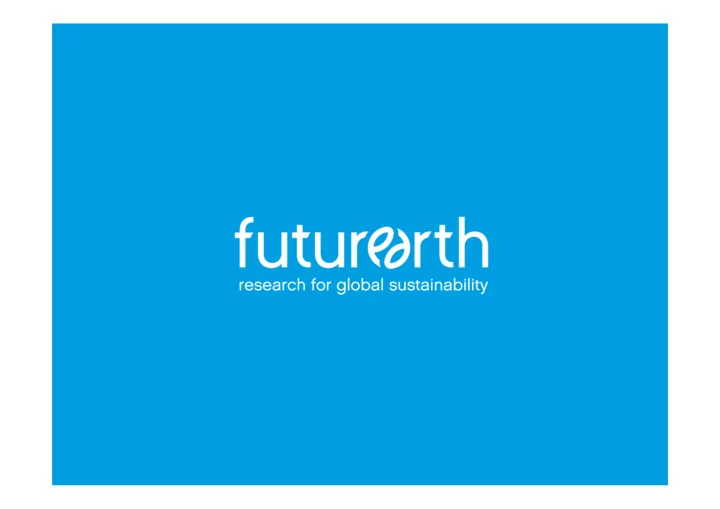

Our objective To provide the knowledge required for societies in the world to face risks posed by global environmental change and to seize opportunities in a transition to global sustainability
Two key aims • Scientific integration • Co ‐ production of knowledge: solutions ‐ oriented
Grand challenges for science • Planetary stewardship • Social equity • Human well ‐ being and security A new sense of urgency and pressure to contribute to real ‐ world problem solving
Complex challenges • Feeding 9 billion people within sustainable planetary boundaries • Valuing and protecting nature’s services and biodiversity • Transitioning to low carbon societies • Adapting to a warmer and more urban world • Coping with disasters • ….
Origins of Future Earth 1980 1986 1991 1996 2001
Examples of GEC projects 1 • ecoSERVICES : links between biodiversity, ecosystem functioning and services
Examples of GEC projects 2 • PAGES: Past Global Changes
Examples of GEC projects 3 • Earth System Governance : Governance for sustainability: navigating the Anthropocene
Examples of GEC projects 4 • CLIVAR: Variability and predictability of the ocean ‐ atmosphere system
Developing Future Earth ICSU – ISSC Visioning Science and Technology Alliance for Global Sustainability 11
What is Future Earth? • A global platform for international research collaboration on global environmental change and sustainable development • Provides integrated research on major global change challenges and transformations to sustainability • Strengthens partnerships between researchers, funders and users of research through co ‐ design of research • Is solutions ‐ oriented , aiming to generate knowledge that contributed to new more sustainable ways of doing things
13
Co ‐ Production of Knowledge 14
Co-designing research Source: Mauser et al., COSUST , 2013
Research Themes 1. Dynamic Planet 2. Global Development 3. Transformations towards Sustainability
Dynamic Planet projecting environment • Approaches and Models drivers societal system observing • States and Trends thresholds explaining understanding • Critical Zones coasts tropical forests polar regions
Global Development clean air • Stewardship of resources mining materials biodiversity • Ecosystem services Trade ‐ offs climate change fisheries • Equitable access water availability food security healthy environment
Transformations towards decision making Sustainability • Transformation process mega ‐ cities economy development options • Innovation and ideas emerging technology trade ‐ offs assessment of policies • Global and regional governance incentives international law regional enforcement
Current status Recent • Scientific Committee established • Interim Secretariat • Director appointed and secretariat hosted by ICSU in Paris, France Short ‐ term priorities • Further develop Future Earth governance • Bring existing GEC projects into Future Earth • Launch new Future Earth projects and initiatives • Consolidate Future Earth communications and brand • Attract new resources into Future Earth science and action
Future Earth Science Committee (2013)
Science and Technology Alliance for Global Sustainability WMO (observer) 22
Funding
Get involved 1. Sign up to the Future Earth Newsletter 2. Bring your scientific communities to Future Earth a. Opportunities to engage with international global change research communities b. Greater visibility to stakeholders c. Participation in high ‐ level science ‐ policy fora d. Access to Future Earth integration activities e. Benefit from Future Earth global identity and communications f. Become part of a unified voice to science funders
Website: www.icsu.org/future ‐ earth Blog: www.futureearth.info Facebook: www.facebook.com/futureearth.info Twitter: @FutureEarth
Recommend
More recommend